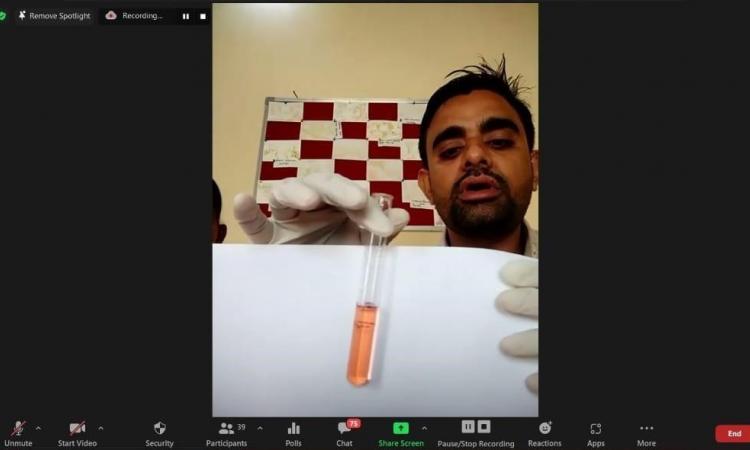
The journey of the Water Quality Management (WQM) Course into a movement with over 1500 WaterQualityChampions’ (WQC) across the country is curious and exciting. The course is enabling participants into “Water Quality champions” that even the course creators did not anticipate. Hence, it demands a closer introspection - into what went behind. This will help both us and the readers unravel this growing movement which is touching lives of 1500 known individuals & countless unknown.
Before delving into the what, when and how of the course let's take a look at these interesting insights from the WQM course batches.
Insights from the WQM course (as of December 2022)
| Number of sessions completed | 239 |
| Trainers | 61 |
| Participants | 1506 |
| Attestations issued | 13797 |
| Content consumed | 7533 |
A government official has applied four times for the WQM course and has attended every meeting, while a chemist by profession attends each meeting since he enjoys doing the assessments. Due to the variety of trainers, a participant from Odisha feels like every session presents something new to learn, so she requests to join again after the session is over.
Like the participants mentioned above there are over 1500 graduates from the WQM course who have their own stories of becoming Water Quality Champions. There is a constant motivation & belief in Water Quality Champions which is enabling many more participants to join this movement.
A glimpse into the Water Quality Management Course by INREM Foundation
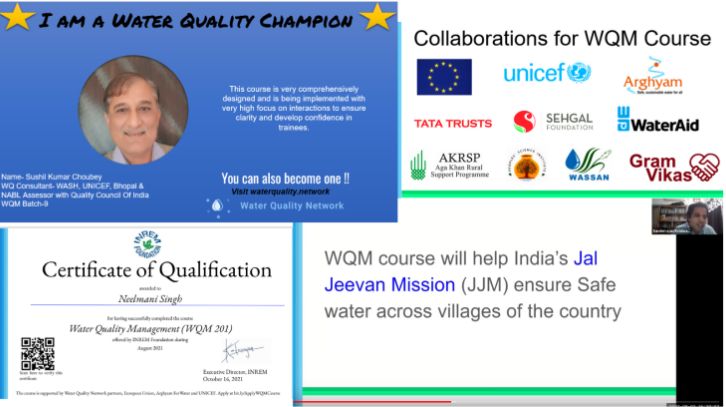
Water Quality Champions - The Beginning
The year of 2021 - was a year of change for many. The limitations from Covid 19 transformed the working and personal landscape and made video conferencing a necessity. Faced with the need to orient itself, INREM Foundation also innovated its strategy to reach out to its partners & communities where it worked. A virtual engagement, for which the credit goes to Ooloi Labs, began a few months after Covid-19 outbreak in 2019 to help members understand water quality issues in Gujarat for the Pravah network.
Triggers for the WQM Course
The WQM course was not the first attempt of INREM at educating its partners and communities through virtual meetings. However, it was a journey we had taken to reach there. 3 main factors that led to the WQM course are:
- Starting out with Virtual mode for Capacity Building: The various trainings that we undertook before the development of the WQM course helped us: to devise the basic etiquettes of an online meeting while interacting with large groups; design the element of engagement into such remote interactions and develop the course into simpler, smaller modules with clear learning objectives.
- Demand of the ecosystem for supporting National Jal Jeevan Mission: The Department of Drinking Water and Sanitation chose INREM as its sector partner for the Jal Jeevan Mission (JJM). Therefore, we developed the need to reach stakeholders associated with program implementation, to build their foundational knowledge on water quality management and consequently set the stage for the WQM course.
- Resurgence of Water Quality Network (WQN): With the support of our partners, we brainstormed and suggested relevant topics to build capacities that will be able to address the growing concern of drinking water contamination in July 2022. These inputs became the building blocks of the learning modules of the WQM course.
Water Quality Champions Journey
It started with a belief within us that there are many who are already working to solve the water quality and management issues. With the right direction and resources, they could champion the solutions to these issues. As an organization with limited resources, we had to innovate and change the strategy in contrast to the traditional training methods, which require a lot more time and resources.
It is in this aspect, INREM innovated the capacity building effort by launching the WQM course while incorporating certain motivational and competitive aspects within the course. The design of the course was on a simple principle - make Water Quality Management simple to understand, for anyone, anywhere - to easily get connected and become a Water Quality Champion.
Albert Einstein once said “In the midst of every crisis, lies a great opportunity.”
The team within INREM endorsed this opportunity of innovating to respond to the learning gap using different tools and technology to connect with the learners remotely. On Aug 3rd 2021, at 3 pm - around 100 participants joined the 1st session of WQM Course.
WQM Course to Water Quality Champions Movement
INREM adopted certain principles to help build foundational knowledge on Water Quality Management for anyone joining the course. The course aims to enable participants to understand and develop relevant tools and strategies to respond to India's water quality problems. While several online platforms offering innovative course design, content-specific quizzes, and certification, gave clues to developing the WQM course, however, engaging the learners was a challenge.
Sharing some of the strategies that worked well in the WQM course to ensure better learning experiences for participants here:
- Course design - Learning Opportunities for everyone
The course objective is to enable anyone to gain foundational knowledge on water quality management in a simple and easy manner. This allowed individuals of diverse needs interested in applying to the course i.e., from beginners to advanced learners.
The modules within the course offered learners not just the understanding of the basics but also the tools & techniques which is of immediate value to professionals working both in the government and non-governmental interventions on water security and quality. This expectation of the course was clearly communicated to every participant - which became one of the key reasons for attending the course.
Sessions of the WQM course with their objectives
| Week | Session | Objective |
| 1 | Session 1 | Introduction to course and broad expectations Softwares to be used and clarifications Water quality in India: Some basics |
| 1 | Session 2 | WQ Standards, and basic water testing |
| 2 | Session 3 | Basics of WQ health impacts and identification |
| 2 | Session 4 | Educating on Water treatment techniques and choosing appropriate solutions |
| 3 | Session 5 | Water safety planning, Household level Behaviour change and communication at community level |
| 3 | Session 6 | Safe water learning cards for Frontline workers |
| 4 | Session 7 | WQ in JJM - VAPs, Neer and WQ&MS |
| 4 | Session 8 | Planning a WQ management programme for villages - Assessment, BCC, Implementation, O&M, Sustainability |
| 5 | Session 9 |
Stakeholder management on WQ in JJM - DWSM, ISA, VWSC - Roles and Responsibilities, timelines and convergence |
You can access the details of the WQM course module and the sessions in this course brochure here.
- Connecting with potential learners
The WQM course originally targeted professionals working in water quality who could improve their skills through this course, however, it became necessary to open the course to everyone with an interest in learning about water quality management. Since the scope of the course was on drinking water, it made sense for government officials working on implementation of the National Jal Jeevan Mission to be part of this course.
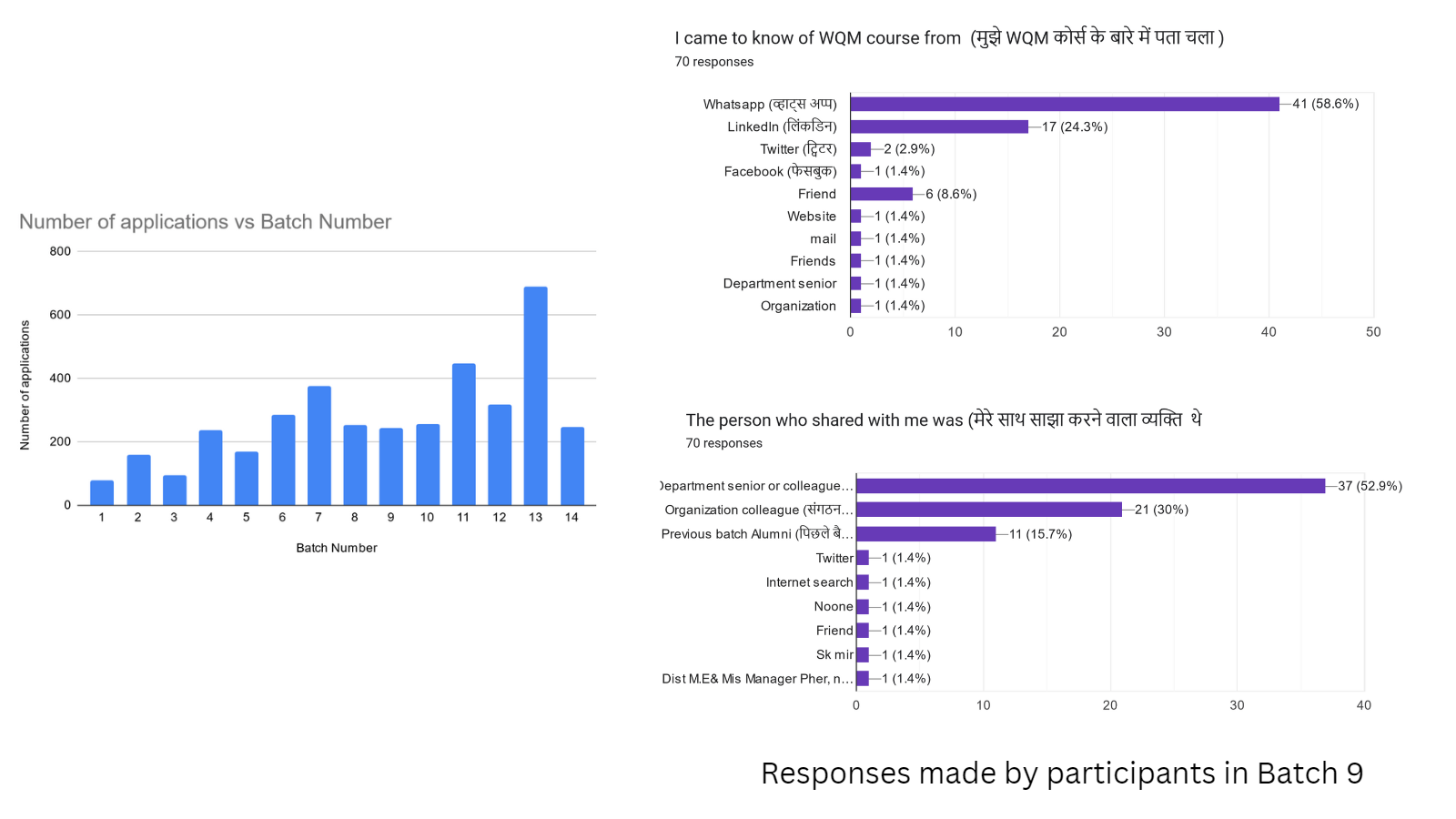
The WQM course was promoted through emails, messages and using social media platforms like WhatsApp, LinkedIn, Facebook. Existing participants promoted the course within their network to spread the belief of becoming Water Quality Champions. This led to an increase in the number of applications for the course from time to time.
As a sector partner to JJM, the course was also offered to support government department officials involved in implementing the Jal Jeevan Mission. In many instances, senior department officials participated in the course, acknowledging the learnings - before recommending it to their colleagues. In other words, Water Quality Champions graduating from the previous batches remained one of the core influencers who helped in promoting the course.
- Creating a positive learning atmosphere
The learning experience was designed to accommodate the various participant types since some were having no or substantial knowledge of water quality management. Moreover, capturing the attention of the participant over a month is quite a challenge. The course needed innovative approaches and tools to meet such challenges and engage participants with active learning strategies appropriate to virtual interactions. 4 key elements incorporated into the WQM course that led to a positive learning atmosphere are as below:
1. Session Design & Management - To achieve learning outcomes
Instead of the standard practice of focussing on instructional learning which consumes most of the time allocated for the training and often leads to losing attention of participants, every session of the WQM course included several small sections like recap of the previous section, announcements, evaluation of assessments, in addition to the learning component.
Each section was meticulously planned with the time needed to complete it and was assigned to a different person (usually four instructors participated per session) to avoid monotony. One of the engaging activities for the participants is the formative assessment after every sub-session.
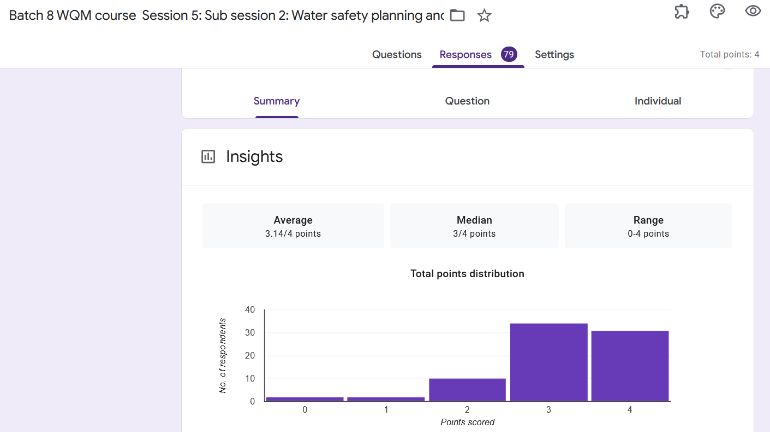
Below are some components that improve the learning atmosphere and take very little time yet provide more engagement with the course participants.
| Components | Time Impact | Purpose | Impact on participation |
| Recap | Minimal | To connect back with the previous session learning | High |
| Tips | Minimal | To help participants | High |
| Sub-session 1 | Major | Achieving learning outcome | Medium to high |
| Assessment 1 | Minimal | To help assess the immediate learning from the session | Medium to high |
| Sub-session 2 | Major | Achieving learning outcome | Medium to high |
| Assessment 2 | Minimal | To help assess the immediate learning from the session | Medium to high |
| Sub-session 3 | Major | Achieving learning outcome | Medium to high |
| Assessment 3 | Minimal | To help assess the immediate learning from the session | Medium to high |
| Field Demonstration | Minimal | Supporting the learning outcome | High |
| Expert Interaction | Minimal | Live interaction to understand different aspects of the subject | Medium to high |
| Conclusion | Minimal | Summarising the learning outcomes for the session | Medium to high |
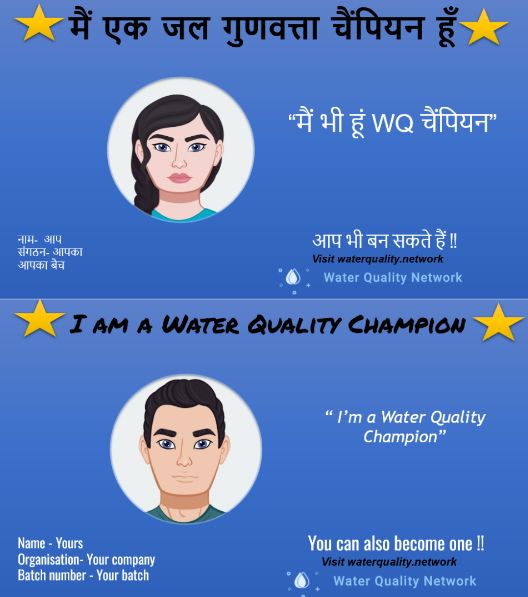
2. Building Motivation
As a way to keep the learning experience momentum and encourage participants to ask questions and share their experiences, the team provided multiple forms of support for participation. One of those strategies was to acknowledge participation, which served as one of the main strategies to help build or maintain motivation. Due to the large number of participants, we focused our attention on the chat and based on how often the participant responded to questions in the chat box, the Water Quality Champions were recognized for every session.
3. Digital Certification
To support participants in improving Job prospects: The WQM course participants are provided with a digital certificate once they complete the certain requirements communicated in the first session of the course. This has built the trust and confidence in the WQM course. Many have taken to add their course affiliation in Professional Career networking platforms like LinkedIn. The WQM also has its own page - which can be accessed here.
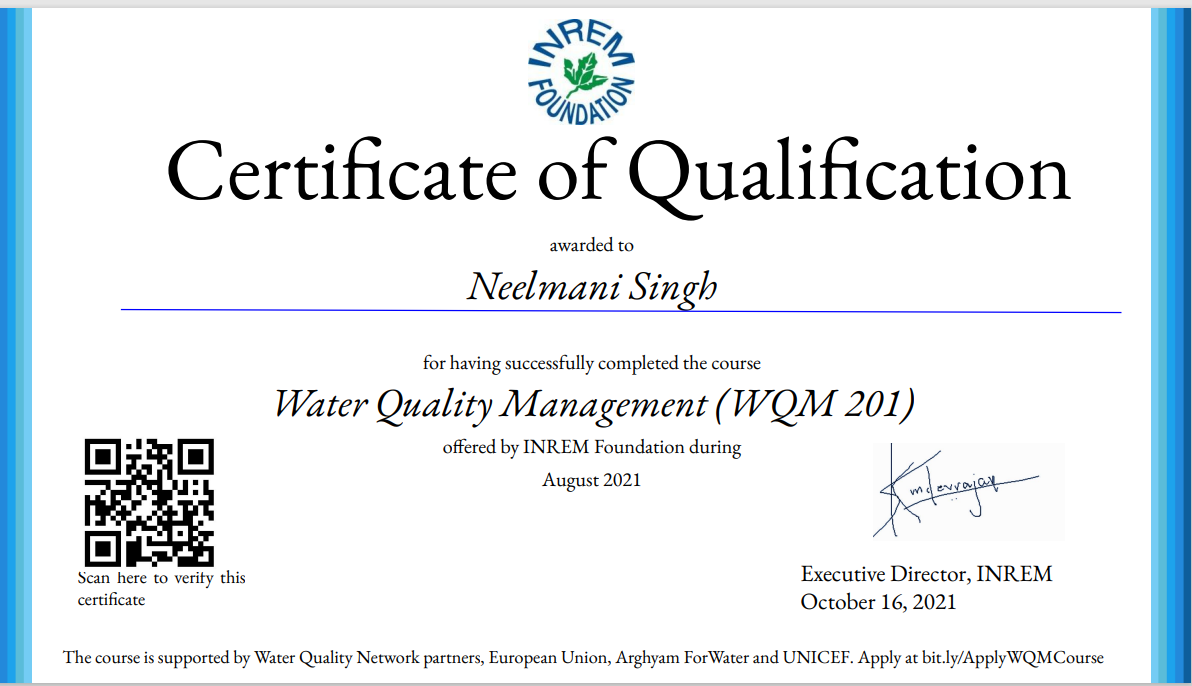
4. A Dedicated Team - Pivoting from Field to Facilitators
For managing any programme, it requires individuals to come together and coordinate to achieve the desired outcomes.
As the WQM program followed a format with a variety of sections, it benefited from the team members' on-the-ground experience across geographies, which would not have been possible if it had been conducted in a traditional manner. As a result, the team has reimagined its ability to take multiple roles in sharing their learnings and observations and this has opened up opportunities for many within the team for self & professional growth.
Takeaways from the WQM course
For any program to succeed, it is necessary to maintain a consistent effort and evolve throughout the journey. We have been able to improve with each batch by applying certain strategies, such as gaining interest from people from different backgrounds, acknowledging participation during sessions, and maintaining participants' engagement through assessments.
Even though we have faced many challenges and learned from them, we have been able to maintain our commitment to creating Water Quality Champions in every village in India, and the WQM course will continue to motivate champions to address the water quality issues of today and tomorrow.
You can also become one. Get enrolled to the next batch by applying to this form - bit.ly/ApplyWQMCourse
/articles/water-quality-management-course-not-just-training-program